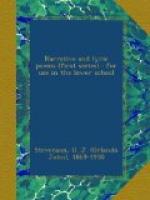—Arnold.
[1] Oxus. One of the great rivers of central Asia, forming the boundary between Persia and Turan, or Tartary.
[2] Tartar. A general name given to the tribes in central Asia east of the Oxus.
[3] Peran-Wisa (Pe’ran-We’sa). The commander of the Tartar tribes which formed the army of King Afrasiab.
[4] Pamere. A plateau in central Asia.
[5] King Afrasiab (Afra’-siab). King of the Tartars.
[6] Samarcand. A city in Turkestan.
[7] Ader-baijan (Ader-bi’-yan). A province of Persia.
[8] Seistan (Sa-es-tan’). A district of eastern Persia.
[9] Perhaps because he is beginning to feel old, or on account of some quarrel with the Persian king.
[10] Kara-Kul. A district in Persia.
[11] Casbin. A city in Persia.
[12] Elburz. A mountain range in northern Persia.
[13] Aralian estuaries. The mouth of the rivers flowing into the sea of Aral.
[14] frore. frozen.
[15] Bokhara and Khiva. Districts of central Asia.
[16] The Tartars use an intoxicating liquor called koumiss, made from mare’s or camel’s milk.
[17] Lines 118-134 mention various nomadic tribes; the names are of no great importance.
[18] Attruck and Jaxartes (l. 126). Names of rivers.
[19] more doubtful service. Their allegiance was doubtful; they were not bound to follow the army of King Afrasiab.
[20] Kuzzaks. Cossacks.
[21] Khorassan. A province of north-eastern Persia.
[22] Cabool. Cabul, the capital of Afghanistan. The trade route between Cabul and Hindustan crosses the mountains at a great height.
[23] Iran. The original came of Persia.
[24] in plain arms. Without any device on his shield.
[25] fluted spine. The hollow spike at the top of the helmet, in which the helmet-feather or crest is fitted.
[26] Dight. decked.
[27] Bahrein. An island.
[28] tale. number.
[29] perus’d. scanned.
[30] tried. experienced.
[31] Be govern’d. Take my advice.
[32] Chang’d gifts. Exchanged gifts, as a sign of friendship.
[33] Success is changeable as the wind.
[34] plummet. The lead used for sounding the depth of the sea.
[35] Hyphasis or Hydaspes. Two great rivers in northern India.
[36] wrack. ruin, destruction.
[37] that autumn star. Sirius, the dog star.
[38] minion. darling, or favorite. The word is generally used to express contempt.
[39] Koords. The people of Kurdistan.
[40] It will be rumoured, or bruited, abroad.
[41] style. title or name.
[42] According to the original legend, Rustum left an amulet, or charm, with the mother of Sohrab. Arnold has altered this detail of the story, and substituted a seal for the amulet.




